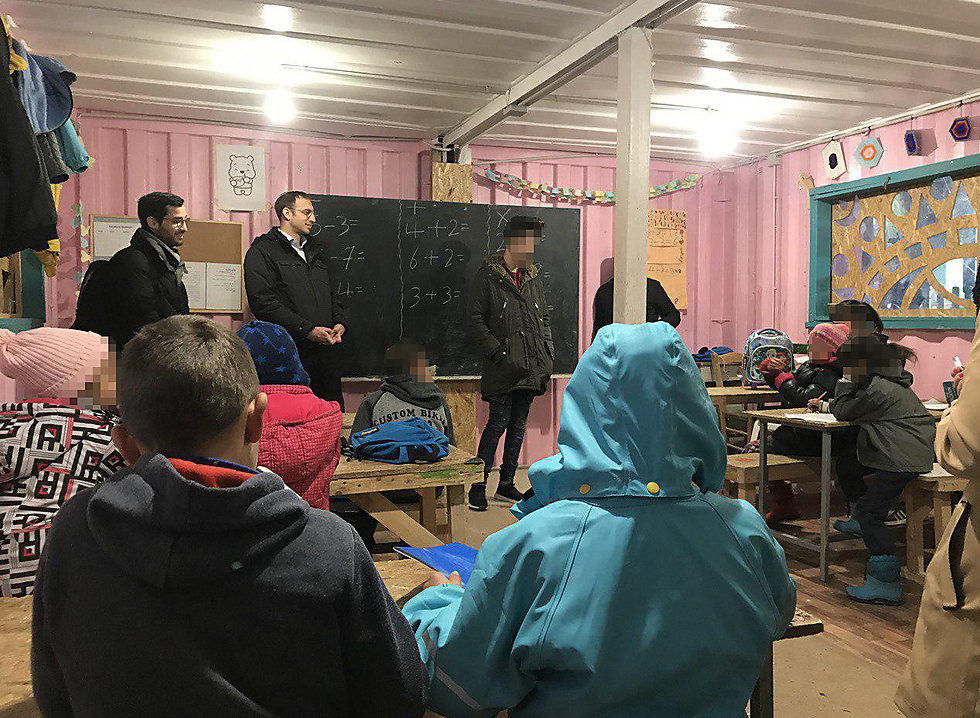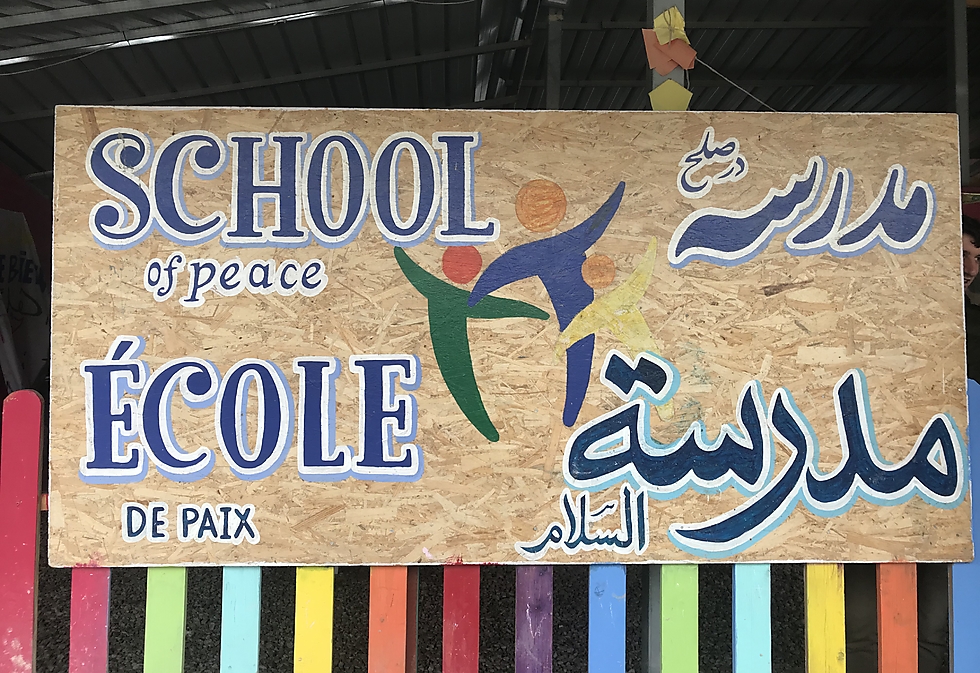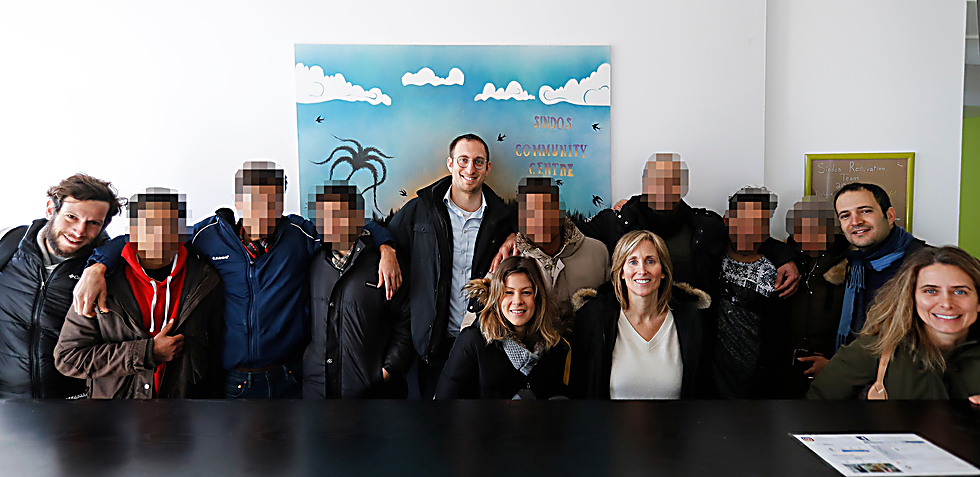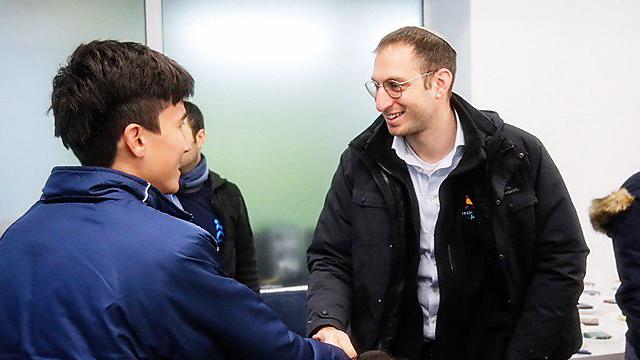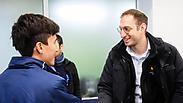
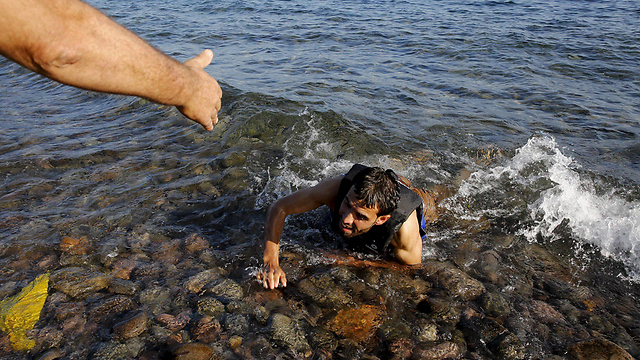
For Syrian refugees in Greece, Israel is no longer the enemy
Greek refugee aid centers are mainly operated by Israelis; in Lesbos there is an Israeli school for Syrian, Iranian, Iraqi and Afghan refugees; and it is all part of a joint plan to revolutionize the concept of 'Tikkun Olam' and Jewish volunteering around the world
LESBOS - "My whole life, all through my childhood in Syrian schools, I was taught that the Israelis are the enemy, and then the first thing I see when I approach the Greek coast is the Star of David on the shirts of Israelis who reach out and place me on the ground."
The speaker is H., aged 20, from Aleppo in northwestern Syria. H. lives in a refugee camp on the Greek island of Lesbos and, according to the United Nations, is one of 60,000 Syrian refugees in Greece, 14,000 of whom live on the Greek islands.
H. escaped the civil war in Syria without his family, and to this day has no idea what happened to them. After spending two years in Turkey, he decided, like hundreds of thousands of other refugees, to try his luck and cross the sea to Lesbos, just a few kilometers from the Turkish coastline. On the beach were waiting members of IsraAID, which since 2011 has been providing humanitarian aid at crisis points around the world, including Lesbos.
Healing the world
The concept of working to build a better world is now being adopted by a major Jewish organization in conjunction with the State of Israel.
The Jewish Agency is now working with the Mosaic United organization on a joint project that is expected to dramatically increase the number of young Jews involved in giving back to their local community. To American Jews, this is known as Tikkun Olam – or healing the world. This Jewish concept became a central tenet among the fourth generation descendants of Jewish immigrants to the United States.
The program is expected to dramatically increase the number of young Jews engaged in social activity, to redefine the term "Tikkun Olam" through working with disadvantaged populations. The projects will be implemented all over the world - from Puerto Rico and Greece to Nepal, Mexico, India and Ethiopia through organizations such as IsraAID, Project TEN, Tevel B'Tzedek and more.
"For the most part, the only thing that makes Jewish students around the world think about their Jewish identity is when there is a BDS (the anti-Israel boycott, divestment and sanctions movement) demonstration on campus, or an anti-Semitic event somewhere around the world," says Rabbi Benji Levy, CEO of Mosaic United. "Such incidents distance them from the desire to be Jewish or associated with Israel."
Levy says the project was adopted by the Israeli government several years ago, under the auspices of the Ministry of Diaspora Affairs. "The government will invest $66 million, which is a third of the budget," he says.
According to UNHCR figures in 2018, more than 5.6 million Syrians have fled since the outbreak of the civil war and the uprising against the Assad regime. Most of them (some 3.3 million refugees) were absorbed by Turkey, and others have also reached neighboring countries such as Jordan (more than 655,000 Syrian refugees) and Lebanon (some 1 million refugees).
The objective is to reach Northern and Western Europe. Their main gateway is Greece, which they try to reach from the coast of Turkey, sailing in rickety boats. More than a million refugees crossed the sea this way in 2015 and at the start of 2016 – going from Greece through the Balkans and Hungary en route to the wealthy countries of the European Union.

One of the most significant and tragic events that brought the refugee crisis to the public's attention was the picture of the body of three-year-old Alan Kurdi, washed up on a beach in southern Turkey in September 2015. In 2017, the United Nations reported more than 2,700 missing people apparently drowned on their way from the Middle East and North Africa to European shores.
At the same time, there was growing criticism among some EU countries over Greece's absorption of refugees, and in 2016 the country was forced to close its northern border to the passage of refugees. The EU signed an agreement with Turkey to halt immigration, at which point the number of refugees arriving in the country began to fall, leaving just several dozen thousand on its territory.
H. is one of those who stayed. We meet at the school run by IsraAid and volunteers from Hashomer Hatzair, an international socialist and Zionist Jewish youth movement. He is employed as a teacher at the school, where he teaches his class of 25 students aged 6-9 in Arabic.
"I was the oldest student in the school, and they needed educational assistance in Arabic, so I became a teacher," he says. "Soon I will leave for Athens, now I have official authorization. I will very much miss the school and the children."
Several thousand refugees live on Lesbos. All of them are waiting for the same permit that H. has received, which allows them to leave the island for the mainland — and Athens in particular.
'Israel is no longer the enemy'
In the meantime. IsraAID and Hashomer Hatzair are trying to help those refugees who are in limbo. They arrived on the island alongside the largest wave of refugees in 2015, when thousands of people would arrive every day.
Today, the Israelis are the last organized body providing humanitarian aid on the island, alongside a solitary community center funded by the European Union and the Greek authorities.
In Lesbos, the Israeli aid workers set up the School of Peace, which had four classes in different languages: Arabic, Dari (a dialect of the Persian language common in Afghanistan), Kurdish and French, for the benefit of refugees from Ghana.
All of the teachers in the school are refugees from the community, and there is also a Greek coordinator who connects the school to the Greek educational system and teaches the language. Most children are expected to leave Greece for other European countries such as Germany, Austria and Sweden, which have more efficient refugee absorption systems, and so they are learning English.
The Israeli school includes students from Iran and Afghanistan, Syria and Iraq, and the long-demonized Jewish state has a new image here. "How can I keep saying that you are the enemy?" asks H.
"I was only exposed to Israelis through television; they told us that Israel is the enemy, but reality has revealed a different truth," says N., a school coordinator and refugee from Iraq. "That's how it is in the Koran - we are cousins."
Beyond language lessons, the children also learn mathematics and physical education. Husna, one of the young students from Afghanistan, tells us how she cannot wait to go to school, since she has never experienced an educational framework before. Fatimah, another student from Iran, says she is acquiring tools to help her in the future. Despite their harsh reality, these young students aspire to move ahead as much as they can. When they grow up, they want to be doctors, lawyers, police officers and politicians.
Ori Schnitzer, who runs the organization's projects in Lesbos and Sindos, says the main problem for the refugees is finding work, which they can only do after registering as refugees and receiving official approval.
The center on Lesbos has coordinators from Israel, Greece and among the refugees.
"We feel like a family," says Anastasia, the Greek coordinator. "We want to give everyone the opportunity to grow."
Anastasia says there are about 600 refugees in the local community in Sindos, 370 of whom have already taken part in activities at the center, where they receive aid, study and receive advice on hygiene and health. N., the refugee from Iraq, has been in Greece for a year now, including four months at the community center.
"They gave me a real opportunity to work here, and I'm happy about that," she says. "I have started the refugee absorption process in Greece and I want to stay here because this is a safe country for us. My whole family is still in Iraq, and I am not in contact with them because it is impossible."
'Other ways of expressing Judaism'
A., a refugee from Iran who has been working with IsraAID for a year, says he sees the center as a family. "Everyone comes from different backgrounds, with different knowledge and language."
We also meet Debbie and Batya, two Jewish designers from the United States, who came to volunteer to renovate the building used by the refugees. Deborah said the two planned to prepare the plan and leave its implementation to the refugees themselves, but the result was beyond anything they could have imagined.
And this is precisely the purpose of the new project - to increase the number of Jewish volunteers around the world.
"Many Jews feel that their connection to Judaism is expressed only in Sabbath observance, kashrut etc., but we want to show them that there are other ways to express ones Judaism," Rabbi Levy says. "One way is through showing kindness to others. We are actually saying to young Jews, 'You have the opportunity to be part of the (Jewish) people and even to lead a common Jewish destiny.' "
Levy says that selecting the various organizations with which to work took serious research. "There are a lot of organizations that do not talk to each other, and are even in competition with one another," he says.
"We have the ability to see everything from the outside and we will create a strategic continuum and a connection between all the organizations."
According to Levy, "studies show that 72% of the young Jews in the world are involved in volunteer work, but just 18% do so in a Jewish or Israeli framework."
When he looks at the Jewish volunteers in the refugee camps in Greece, Levy says he dreams of a "global movement of volunteers from Israel and the Diaspora working to benefit the entire world."















